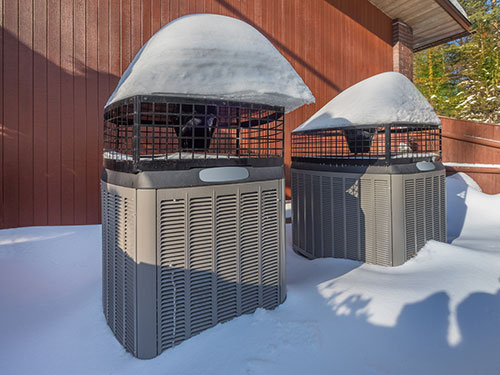An outside air conditioning unit can be a godsend during the hot, sticky summer months. To make sure your A/C unit will be ready when you need it again next spring, you need to protect it against corrosion and debris. Here are five tips for winterizing your A/C unit.
Clean the unit. Autumn weather can leave air conditioning units covered with fallen leaves and droppings from migrating birds. The longer you let debris sit on your unit, the more likely it is to cause a malfunction. Take the time to remove leaves, twigs, grass clippings, bird droppings, dead bugs, dirt and dust. Before the weather turns cold, rinse your unit using a garden hose. You should also regularly remove debris from your AC unit throughout the winter, especially after storms.
Cut the power. While most people simply flip their thermostats to heat during the winter, it’s recommended to completely shut off the air conditioning system. If you don’t, a brief period of warm weather could cause the thermostat to sense incorrect temperatures indoors and switch on the A/C unit. This can draw snow or moisture into the unit and increase the risk of corrosion. Prevent this by locating the electrical circuit, which usually has a metal or plastic lid. After removing this lid, flip the switch to cut the power supply and keep the unit dormant until spring.
Add insulation. To protect against freezing, install rubber or tubular foam insulation around pipes. Be sure to choose a self-adhesive insulation with elbows and tees that can conform to bends and curves to form a tight seal. Place elbows and tees first to promote a snug fit. You should also regularly inspect your insulation throughout the winter to make sure it hasn’t loosened.
Cover the unit. Although A/C units are built to withstand rain, sleet and snow, they have little protection against seeds, nuts and leaves. It’s generally best to cover your unit during the fall to keep debris at bay. That said, you shouldn’t just cover your unit with an old tarp, or moisture may accumulate underneath. What’s more, animals could view the tarp as a cozy shelter against the elements. Many manufacturers make covers which are specifically designed for A/C units. If you can’t find one, use a vinyl or plastic covering that fits over the unit and leaves about a foot of open space above the ground, allowing air to pass in and out.
Make regular inspections. Even if you’ve done an exceptional job winterizing your A/C unit, you will still want to inspect it once a week to make sure the cover is secure. You should also remove leaves, twigs and pine cones, and regularly brush away water puddles, ice and snow. It may sound like an unnecessary burden, but regular inspections can be the difference between an air conditioning unit that comes on like clockwork when the weather turns warm, and one requiring hundreds of dollars in service costs due to neglect.
2-10 HBW offers the most comprehensive Home Warranty coverage for homeowners. Let us help you protect your home.








